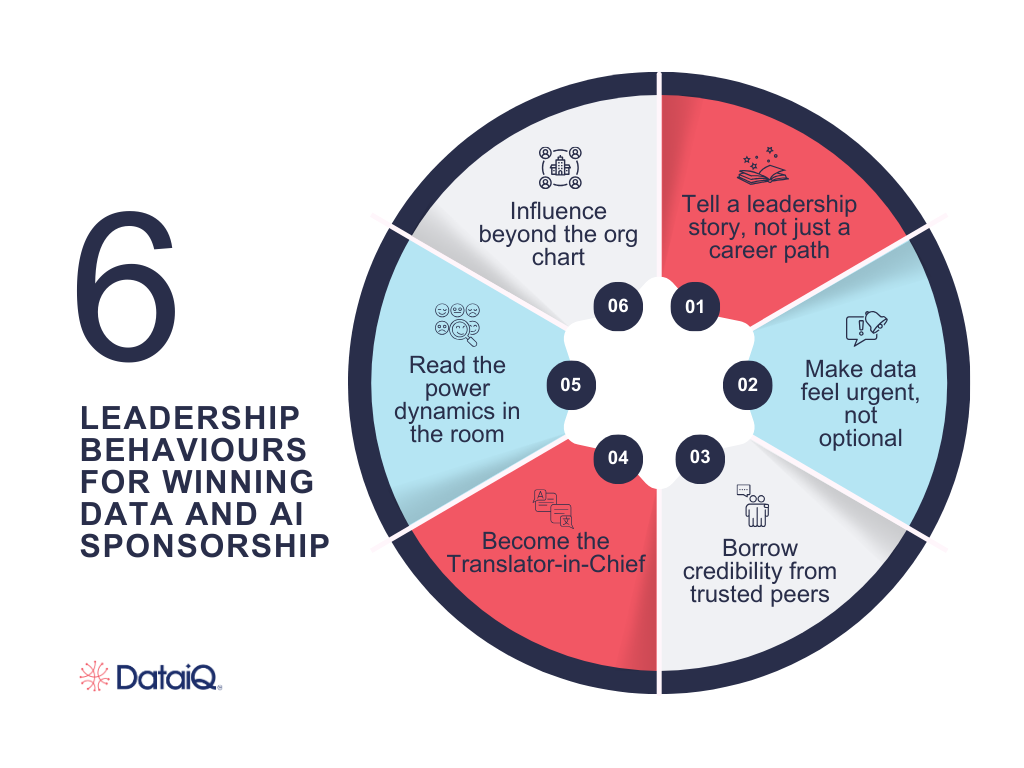Tell a leadership story, not just a career path
Many leaders emphasise the power of defining and communicating their own leadership narrative: a story that connects their data expertise directly to business impact.
“I make it clear that our work is not just technical but essential to the company’s success,” said Megan Reutin, Global Head of Data Science and Strategy at Grünenthal. “By showcasing early successes and tangible results, I build credibility and generate excitement among stakeholders”, she concludes.
Amy Grace, VP of Data Science and Analytics at Otis, shares how she shapes her strategies and communications not with credentials, but with outcomes: “partner to not only provide a digital solution, but also optimise business processes. And most importantly, deliver results… outcomes over outputs.”
Mikhael Mazu, VP and Head of Metadata Management at Deutsche Bank, adds: “I need to develop a constant, thorough leadership, understand the business priorities/strategy and use a business-friendly language. I make sure that I show that I live the business as much as I love data. Value-driven storytelling is also key for credibility, using examples relevant to business.”
Make data feel urgent, not optional
The most effective leaders frame data as an answer to problems already high on the executive agenda, making it feel essential, not optional.
Chris Gullick, Chief Data and Artificial Intelligence Officer at Ofgem, puts it bluntly: “I regularly present to our executive on the advantages and risks of data and AI, including the risks of not investing in capability.”
Taking a similar approach, Di Mayze, Chief Data and AI Officer at Marks & Spencer, stresses: “We are all committed to finding ways to show how data & AI can play a role in solving problems, increasing productivity and delivering world-class customer experience.”
Linking data to business strategy, Matt Crawley, CDO at Lebara, states that once data and AI leaders prove how the business strategy can be accelerated with data, “every big decision comes with the question of ‘what data do you have to back this up?’ or ‘how can data help us in this situation?’ and so data becomes a necessity rather than an option.”
Borrow credibility from trusted peers
Aside from advocating for the data function, the DataIQ 100 amplify their message by partnering with already trusted stakeholders.
Describing a coalition of champions, Rebecca Fitzgerald, Director of Architecture, Data and AI at Yorkshire Building Society, shares: “The support of the executive team is crucial in driving the implementation of our data strategy and advocating for data management. Their leadership demonstrates positive shifts within their respective business areas… By showcasing our successes and highlighting ambassadors who exemplify our goals, we demonstrate the positive shifts in embedding our data strategy.”
Ghada Richani, Managing Director of Strategy and Initiatives Executives at Bank of America, defends that “securing senior-level support to champion and prioritise data initiatives across the organisation” is crucial to win and keep sponsorship.
Become the Translator-in-Chief
Another recurring behaviour among successful leaders: they excel at translating technical complexity into commercial clarity, making their work understandable and compelling to non-technical peers.
“I often say that my job is really a sales job – I’m working to sell the work and ideas that my team produces to key stakeholders in the organisation. It’s my job to translate the great work my team does into CEO speak, or CMO speak, or CFO speak,” says Jonathan Hay, SVP of Business Strategy and Analytics at Boston Red Sox.
Steve Janoo, Chief Data Analytics Officer at Diageo Plc., advises data and AI leaders to “demystify and simplify data for functional and market leadership; speaking the same language.”
Avinash Tripathi, Vice President of Analytics at University of Phoenix, summarises: “Data leadership requires more than technical expertise—it demands the ability to align initiatives with overarching business goals and communicate their value in terms of ROI, efficiency gains, and competitive advantages, avoiding the pitfalls of technical jargon.”
Read the power dynamics in the room
Several DataIQ 100 point to the importance of emotional and political intelligence. These leaders have awareness of the organisation’s culture, the players involved, and the unspoken dynamics that shape decisions. They adjust their approach to fit the environment.
As stated by JoAnn C Stonier, Fellow of Data and AI at Mastercard: “Data leaders need to define their roles in their firms, which depends upon their firm’s data profile, their own skills and key partners for execution in their firm. By identifying, defining and executing their role seamlessly with the product and sales organisation, data leaders can ensure success both at the top of the house but also with peers and teams necessary for execution and operational success.”
Jared Weiss, Vice President of Data Science and Advanced Analytics at AARP, underscores that awareness begins with humility and respect: “I’d say above all else: listening. People have spent years learning their craft, so barging in and saying we know better can be counterproductive. I’ve found developing relationships based on respect has led to more effective engagements.”
Influence beyond the org chart
Finally, the most influential data and AI leaders build credibility in ways that extend past formal reporting lines, becoming trusted advisors across the organisation.
Adopting a multifaceted position to influence across the organisation, Lauren Sager Weinstein, CDO at Transport for London, shares: “My job exists to be both TfL’s Data Detective and our Data Evangelist. My detective role means that I have to discover where using data can help us make ‘Every Journey Matter for our Customers’… With my ‘Data Evangelist’ role, I also get to be our data champion and cheerleader—to encourage people to use data, and to understand how to get value from data…I also see my role as ‘hand-holding’, as the concept of using new data tools can seem overwhelming sometimes. It’s therefore my job to help break down barriers so people can understand and use data better.”
Mike Vaughan, CDO at Brown & Brown Insurance, echoes the value of deep engagement: “Spending time with the business to build relationships, promote ideation and understand their key processes and pain points allows us to develop and continually refine a three-year roadmap designed to deliver on our data strategy.”
Jason Beyer, CDO at Fortive, offers a framework: “For business stakeholders, I regularly assess the health of the relationship on three dimensions: engagement, readiness, and overall sentiment. Engagement is the degree of interest, desire to work together, “pulling” on you for more. Readiness is the level of maturity (people, process, tech, and data), their capacity, whether they have shared priorities, and any risks or barriers. Sentiment is a sliding scale from positive to negative with observable attributes that move up/down the scale. All three dimensions should be assessed and considered…”

Leadership that lasts
Leadership isn’t charisma. It’s not tenure. It’s how consistently a leader earns the right to sit (and stay) at the table.
The most influential data and AI leaders treat leadership as a craft: they shape their message, read their audience, listen deeply, borrow trust when needed, and show up with intention.
It’s not the loudest voice that cuts through. It’s the one that consistently lands.
Coming next in the DataIQ 100 Insights Series
This three-part series explored how the most influential data and AI leaders across Europe and North America secure and sustain sponsorship from both, a functional and a leadership perspective. It also explored the regional nuances shaping sponsorship strategies across the Atlantic.
Next, we turn to the future, revealing how the 2025 DataIQ 100 expect the role of the data and AI leader to evolve over the next 12–24 months. Stay tuned!
Join the DataIQ 100 – and stand alongside the industry’s most influential voices.
If you’re leading change in data and AI, it’s time to make it visible. The DataIQ 100 is the first and only fully curated power list of the most influential data and AI leaders who are shaping strategy, culture, and impact across Europe and North America.
Apply now to be considered for the DataIQ 100 2026 and share your story and impact with the leaders defining what excellence looks like. Ready to lead the conversation? Register your details here.
Join the premier gathering for data and AI leaders at the DataIQ World Congress, 4–5 November.
This is where the real conversations happen with people who are making the difference. Find yourself among peers who are shaping strategy, influencing investment, and delivering outcomes driven by data and AI. Celebrate the best at the DataIQ Awards and contribute to the collective momentum of data leadership. Get your World Congress tickets now.





